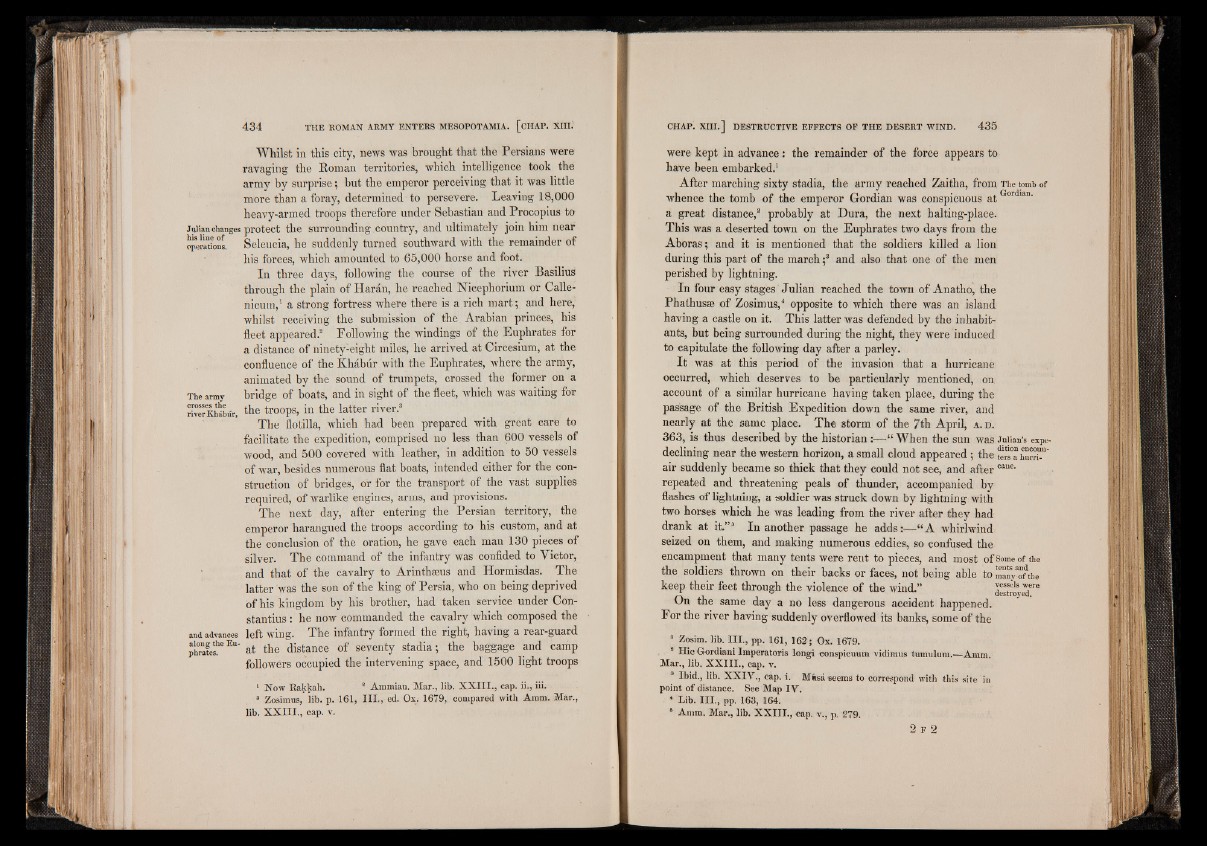
Whilst in this city, news was brought that the Persians were
ravaging the Roman territories, which intelligence took the
army by surprise; but the emperor perceiving that it was little
more than a foray, determined to persevere. Leaving 18,000
heavy-armed troops therefore under Sebastian and Procopius to
Julian changes protect the surrounding country, and ultimately join him near
operations. Seleucia, he suddenly turned southward with the remainder of
his forces, which amounted to 65,000 horse and foot.
In three days, following the course of the river Basilius
through the plain of Harán, he reached Nicephorium or Calle-
nicum,1 a strong fortress where there is a rich mart; and here,
whilst receiving the submission of the Arabian princes, his
fleet appeared.8 Following the windings of the Euphrates for
a distance of ninety'-eight miles, he arrived at Circesium, at the
confluence of the Khábúr with the Euphrates, where the army,
animated by the sound of trumpets, crossed the former on a
The army bridge of boats, and in sight of the fleet, which was waiting for
rive rK hiW r, the troops, in the latter river.3
The flotilla, which had been prepared with great care to
facilitate the expedition, comprised no less than 600 vessels of
wood, and 500 covered with leather, in addition to 50 vessels
of war, besides numerous flat boats, intended either for the construction
of bridges, or for the transport of the vast supplies
required, of warlike engines, arms, and provisions.
The next day, after entering the Persian territory, the
emperor harangued the troops according to his custom, and at
the conclusion of the oration, he gave each man 130 pieces of
silver. The command of the infantry was confided to Victor,
and that of the cavalry to Arinthseus and Hormisdas. The
latter was the son of the king of Persia, who on being deprived
of his kingdom by his brother, had taken service under Con-
stantius: he now commanded the cavalry which composed the
and advances left wing. The infantry formed the right, having a rear-guard
pirates’“ Eu" at the distance of seventy stadia; the baggage and camp
followers occupied the intervening space, and 1500 light troops
1 Now Rakkah. 8 Ammian. Mar., lib. X X I I I ., cap. ii., iii.
3 Zosimus, lib. p. 161, I I I ., ed. Ox. 1679, compared with Amm. Mar.,
lib. X X I I I ., cap. v.
were kept in advance : the remainder of the force appears to
have been embarked.1
After marching sixty stadia, the army reached Zaitha, from The tomb of
whence the tomb of the emperor Gordian was conspicuous a tGordmn-
a great distance,8 probably at Dura, the next halting-place.
This was a deserted town on the Euphrates two days from the
Aboras; and it is mentioned that the soldiers killed a lion
during this part of the march ;s and also that one of the men
perished by lightning.
In four easy stages Julian reached the town of Anatho, the
Phathusse of Zosimus,4 opposite to which there was an island
having a castle on it. This latter was defended by the inhabitants,
but being surrounded during the night, they were induced
to capitulate the following day after a parley.
It was at this period of the invasion that a hurricane
occurred, which deserves to be particularly mentioned, on
account of a similar hurricane having taken place, during the
passage of the British Expedition down the same river, and
nearly at the same place. The storm of the 7th April, a . d .
363, is thus described by the historian :— “ When the sun was Julian’s expe-
declining near the western horizon, a small cloud appeared; the t e a “ ’
air suddenly became so thick that they could not see, and after
repeated and threatening peals of thunder, accompanied by
flashes of lightning, a soldier was struck down by lightning with
two horses which he was leading from the river after they had
drank at it.”5 In another passage he adds:— “A whirlwind
seized on them, and making numerous eddies, so confused the
encampment that many tents were rent to pieces, and most of Some of the
the soldiers thrown on their backs or faces, not being able to m°ny“ fthe
keep their feet through the violence of the wind.” ¡f¡j¡N "ere * ^ " destroyed.
tin# the same day a no less dangerous accident happened.
For the river having suddenly overflowed its banks, some of the
1 Zosim. lib. I I I ., pp. 161, 162; Ox. 1679.
8 HieGordiani Imperatoris longi conspicuum vidimus tumulum.—Amm
Mar., lib. X X I I I ., cap. v.
3 Ibid., lib. X X IY ., cap. i. M isa seems to correspond with this site in
point of distance. See Map IV .
4 Lib. I I I ., pp. 163, 164.
3 Amm. Mar., lib. X X I I I ., cap. v., p. 279.